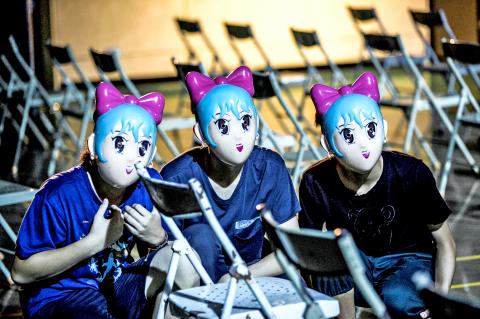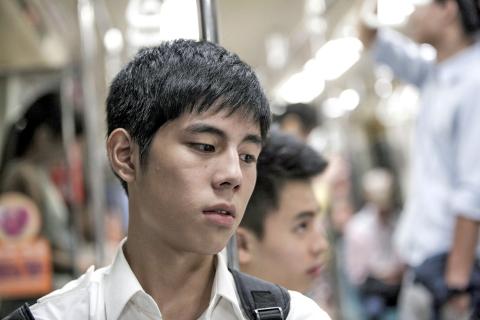At a time when the sound of teen film spells overuse and cliche, Yee Chih-yen’s (易智言) Meeting Dr. Sun (行動代號:孫中山) comes as a refreshing surprise. The comedy, about a group of teenage boys and their whimsical plans to address their poverty, casts a lyrical and vigorous look into Taiwan’s social inequality through the eyes of the young. Alternating between farcical humor and emotional acuteness, Yee’s latest work can be seen as an ode to the waves of youthful civil disobedience against the system, which climaxed in the Sunflower movement.
Lefty (Zhan Huai-yun, 詹懷雲), one of the central characters, lives with his grandmother who earns NT$15 for every plastic flower she makes at home. Lefty believes he is the poorest kid in his high school and is unable to pay the “class fee” extorted by a classmate. While hiding from the bully in the school storeroom one day, he discovers a bronze statue of Sun Yat-sen (孫逸仙). For Lefty, however, the statue doesn’t signify the ROC’s founding father, but a financial windfall in the form of scrap metal worth a big chunk of money. The slab, he thinks, will be his ticket out of poverty.
And so he immediately devises a plan to steal and sell the valuable statue, calling on his equally impecunious friends to help. However, he soon finds out that Sky (Wei Han-ting, 魏漢鼎), a boy who goes to the same school, is also plotting to turn the discard into quick cash.

Photo courtesy of Activator Marketing Company
The two hold a match to decide who is poorer and thus needs the money more. Using food tastings at supermarkets as the source of his daily diet and sleeping on the streets to avoid his drunken father’s violent outburst, Sky wins. Readily accepting his defeat, Lefty offers to collaborate with Sky, whom he thinks a new comrade.
Watching the enthusiastic Lefty sharing the details of his plan, Sky has something else in mind.
When the big night comes, two groups of masked thieves appear on campus. The battle over the statute of Sun Yat-sen ends up with Sky and Lefty lying on the empty street in Ximending (西門町), exhausted. As the wailing of police sirens comes near, they recognize the problem of poverty and fight it together.

Photo courtesy of Activator Marketing Company
In Meeting Dr. Sun, director Yee does a superb job in translating the anger against the unjust, corrupt system into an expressive comedy. The most noticeable example is the use of pantomime in the sequence in which the young burglars try to carry out their operation. What’s more striking is how the story finds its most resonant strength in juxtaposing the light with the unbearable. In the sequence in which the group of teenagers bicker over who comes from the most disadvantaged family, what starts out as fun raillery ends up with an indignant cry from Sky: “the children of our children are doomed to be poor.”
More fable than drama, the film approaches the complex social problems with lucid simplicity.
Equally essential to the narrative is the soundtrack composed by Chris Hou (侯志堅). Hou’s music is playful, delicate and vivacious at the same time, almost like a waltz of the humiliated and the insulted.
Towards the end of the film, we follow the bronze statue as it’s transported on a truck through the streets of Taipei. Suddenly, the camera pans up to show the gang of teenage boys, who raise their hands in solidarity, the Taipei World Trade Center towering in the background. It is a poignant moment, filled with poetry, and like the film itself, resonates long after the closing credits.

Last week, the the National Immigration Agency (NIA) told the legislature that more than 10,000 naturalized Taiwanese citizens from the People’s Republic of China (PRC) risked having their citizenship revoked if they failed to provide proof that they had renounced their Chinese household registration within the next three months. Renunciation is required under the Act Governing Relations Between the People of the Taiwan Area and the Mainland Area (臺灣地區與大陸地區人民關係條例), as amended in 2004, though it was only a legal requirement after 2000. Prior to that, it had been only an administrative requirement since the Nationality Act (國籍法) was established in

Three big changes have transformed the landscape of Taiwan’s local patronage factions: Increasing Democratic Progressive Party (DPP) involvement, rising new factions and the Chinese Nationalist Party’s (KMT) significantly weakened control. GREEN FACTIONS It is said that “south of the Zhuoshui River (濁水溪), there is no blue-green divide,” meaning that from Yunlin County south there is no difference between KMT and DPP politicians. This is not always true, but there is more than a grain of truth to it. Traditionally, DPP factions are viewed as national entities, with their primary function to secure plum positions in the party and government. This is not unusual

The other day, a friend decided to playfully name our individual roles within the group: planner, emotional support, and so on. I was the fault-finder — or, as she put it, “the grumpy teenager” — who points out problems, but doesn’t suggest alternatives. She was only kidding around, but she struck at an insecurity I have: that I’m unacceptably, intolerably negative. My first instinct is to stress-test ideas for potential flaws. This critical tendency serves me well professionally, and feels true to who I am. If I don’t enjoy a film, for example, I don’t swallow my opinion. But I sometimes worry

US President Donald Trump’s bid to take back control of the Panama Canal has put his counterpart Jose Raul Mulino in a difficult position and revived fears in the Central American country that US military bases will return. After Trump vowed to reclaim the interoceanic waterway from Chinese influence, US Defense Secretary Pete Hegseth signed an agreement with the Mulino administration last week for the US to deploy troops in areas adjacent to the canal. For more than two decades, after handing over control of the strategically vital waterway to Panama in 1999 and dismantling the bases that protected it, Washington has